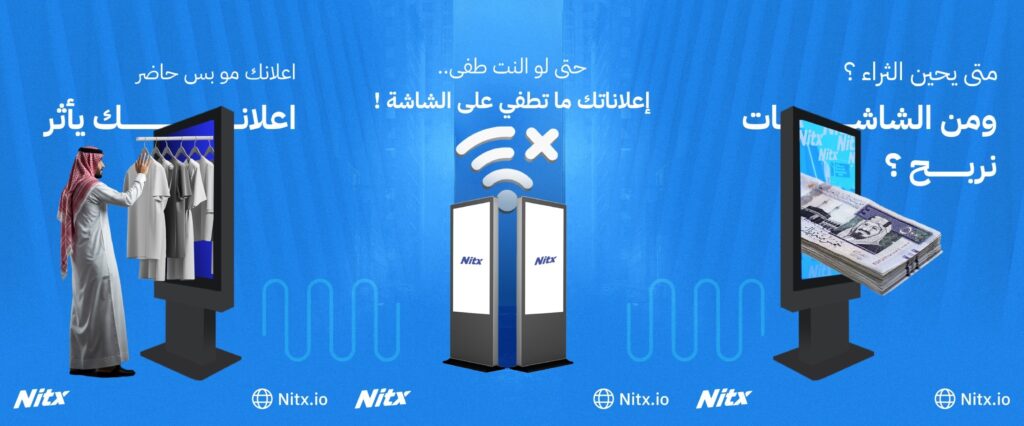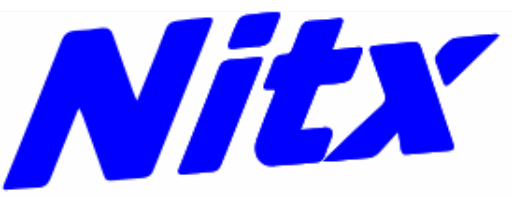
Introduction
In today’s fast-paced, attention-driven marketplace, brands compete fiercely to capture customer interest. Screen management and broadcasting systems have become powerful marketing tools, redefining customer engagement.
Here comes NITX, an innovative solution combining intelligence, speed, and user-friendliness to make digital advertising more impactful than ever.
What is Digital Signage?
Digital signage refers to electronic displays that show multimedia content — images, videos, and text — for the purposes of advertising, information sharing, or brand building.
According to Wikipedia:
“Digital signage is a sub-segment of electronic signage. It uses technologies such as LCD, LED, and projection to display images, video, streaming media, and information.”
(Source: Wikipedia – Digital Signage)
There are two main types of digital display systems:
- Network-connected systems: Cloud-based Content Management Systems (CMS) that can be updated instantly, scheduled, and analyzed for performance.
- Standalone systems: Operate without internet connectivity, with content uploaded via USB drives or SD cards.
The Global Digital Signage Market: Numbers Don’t Lie
Reports from Grand View Research show that the global digital signage market was valued at USD 28.83 billion in 2024 and is projected to reach USD 45.94 billion by 2030, growing at a CAGR of 8.1%.
(Source: Grand View Research – Digital Signage Market)
Similarly, Market.us estimates that the market will hit USD 31.8 billion in 2025 and USD 34.7 billion in 2026.
(Source: Market.us – Digital Signage Statistics)
Why Digital Signage Works So Well
The data is clear:
- 83% of people recall content displayed on digital signage.
(Source: Wallboard.us – Digital Signage Statistics) - Digital signage increases content views by 400% compared to static signs.
(Source: AIScreen.io – Digital Signage Stats 2025) - 47.7% of brands report greater brand awareness compared to traditional advertising.
(Source: AIScreen.io) - 19% of consumers make an immediate purchase after seeing a product advertised on a digital screen.
(Source: Wallboard.us)
NITX: How It’s Changing the Game in Screen Management & Broadcasting
In a marketing environment overloaded with competition, NITX offers a suite of features that stand out:
- Centralized Screen Management
A cloud-based dashboard that allows you to manage multiple screens across various locations from anywhere in the world. - Smart Broadcasting System
Supports automated scheduling, real-time broadcasting, and seamless content uploading. - Integration with Other Platforms
For example, integration with Foodics for restaurants to automatically update and display digital menus. - Advanced Analytics
Track content performance, audience engagement, and identify the most effective time slots. - Cost Efficiency and Speed
Reduce printing costs and respond instantly to market changes.
Real-Life Success Stories
- Global restaurant chain used NITX to display flash promotions in real-time, resulting in a 25% increase in sales within two months.
- Real estate company broadcasted new property listings across mall screens, increasing website visits by 40%.
Best Practices in Digital Screen Management
Screen management is not just about uploading content — it’s about strategic planning, analysis, and ongoing optimization.
According to Digital Signage Today, 70% of businesses that use structured content planning achieve 30% better results than those who don’t.
(Source: Digital Signage Today)
1. Define the Content Objective
Know whether your content is aimed at promoting products, directing visitors, or strengthening your brand image.
2. Keep Content Fresh
Repetitive content loses effectiveness. Studies show that changing content every 2–3 days increases audience engagement by 32%.
(Source: ScreenCloud)
3. Customize by Location and Time
Using a smart broadcasting system, you can display different content during peak hours compared to quieter times.
4. Use Live Data Integration
Incorporating live updates like weather, news, or flash sales boosts viewer interaction.
(Source: ScreenCloud)
Comparing Traditional Broadcasting Systems with Modern Solutions
| Criteria | Traditional Systems | Modern Solutions like NITX |
| Cost | High printing & maintenance | Lower due to digital delivery |
| Update Speed | Slow (days/weeks) | Instant (seconds/minutes) |
| Audience Interaction | None | High with live data |
| Analytics | Not available | Available with detailed insights |
Future Market Trends
According to Fortune Business Insights, the digital signage market is expected to undergo a massive transformation by 2032, driven by AI and AR technologies, reaching USD 63.3 billion.
(Source: Fortune Business Insights)
1. Artificial Intelligence (AI)
AI will enable real-time audience behavior analysis and automated content adjustments.
2. Augmented Reality (AR)
Adding interactive layers to screens for a more immersive viewer experience.
3. Solar-Powered Outdoor Screens
Reducing operational costs and supporting sustainability initiatives.
How Businesses Can Leverage NITX
- Retail Stores: Showcase daily promotions instantly.
- Restaurants: Update menus and prices in real time.
- Educational Institutions: Display announcements and alerts for students.
- Healthcare: Run awareness campaigns in waiting areas.
Extended Conclusion
Today, screen management and broadcasting systems are no longer just tools for displaying ads — they are strategic assets for delivering the right message at the right time and place. With solutions like NITX, organizations gain unprecedented control, drive business growth, and achieve measurable ROI.
